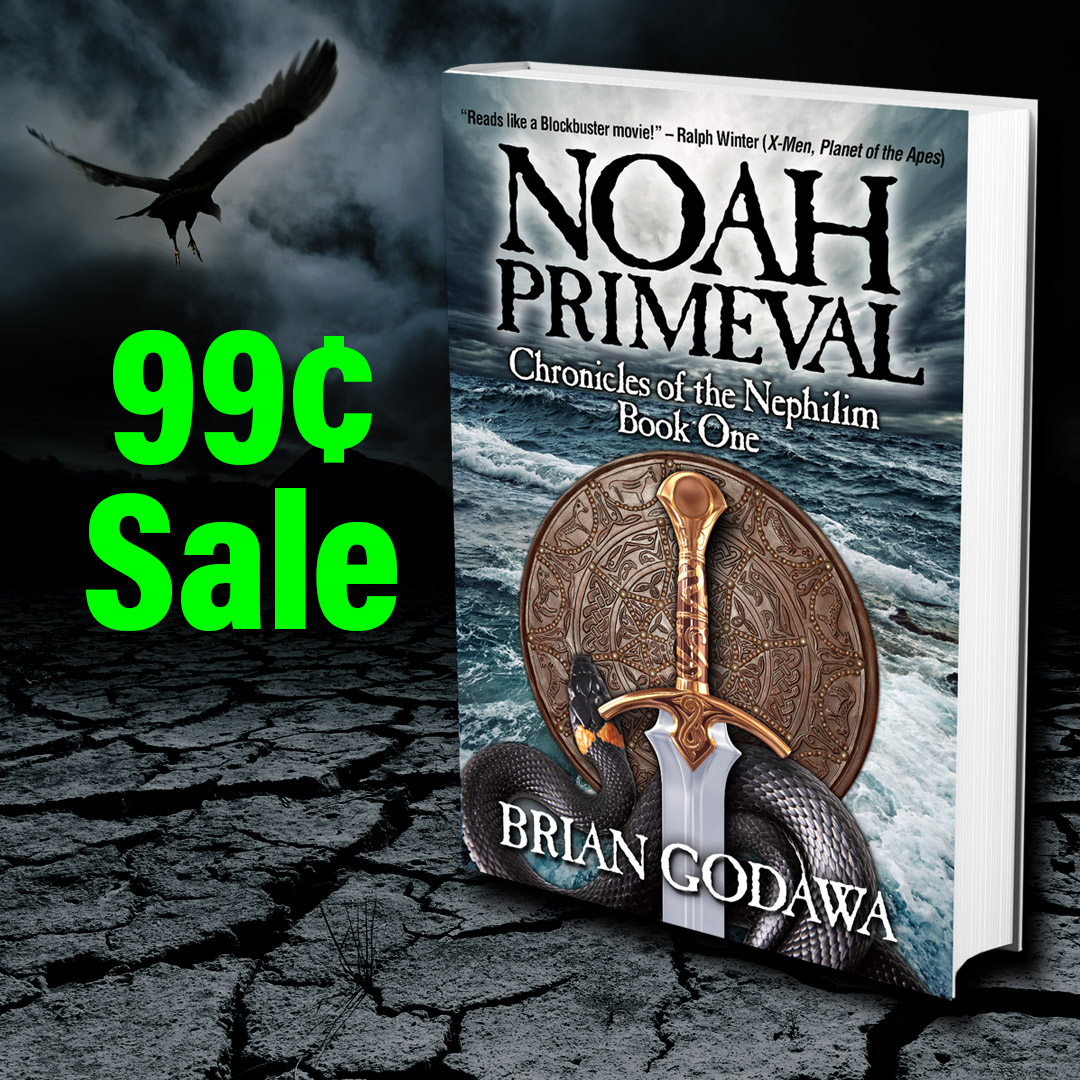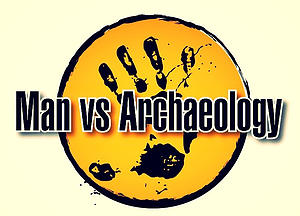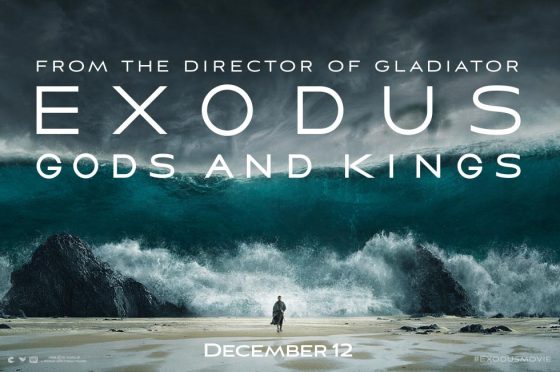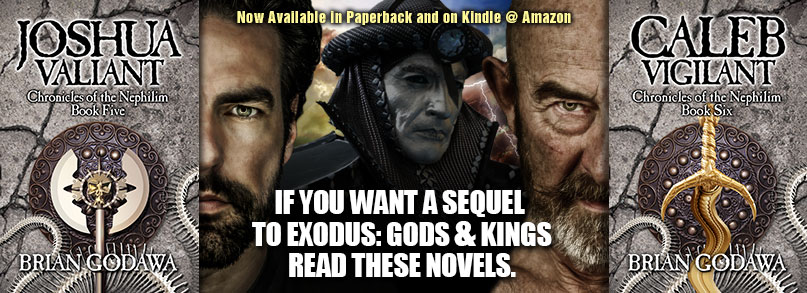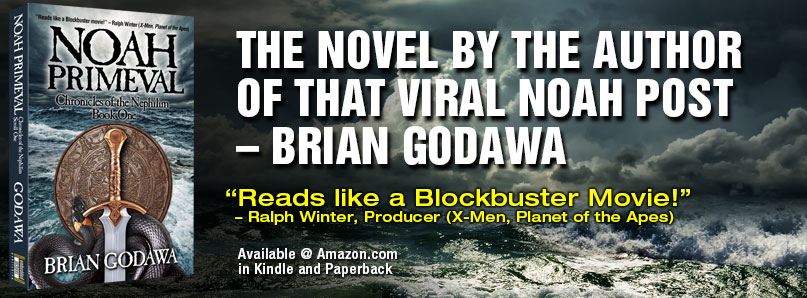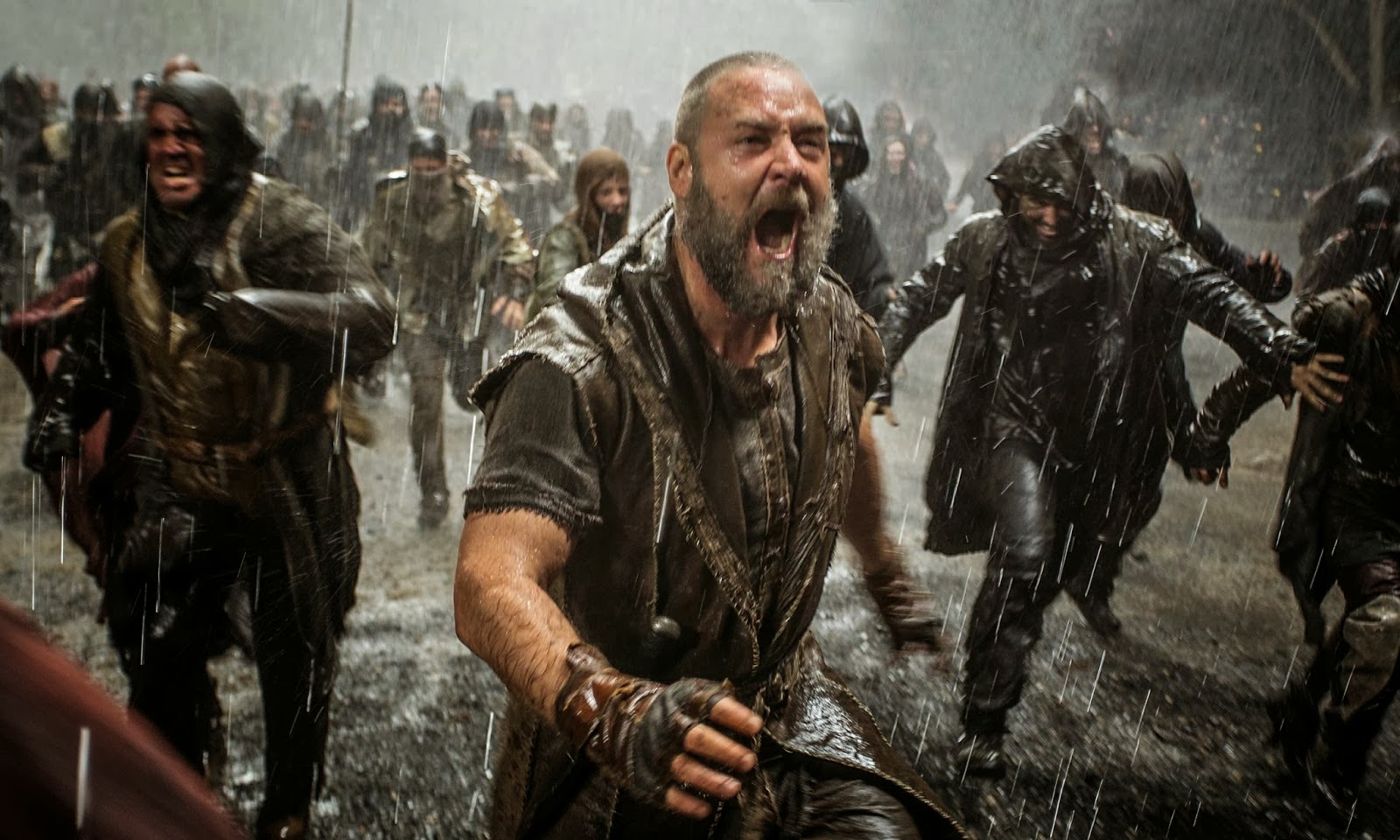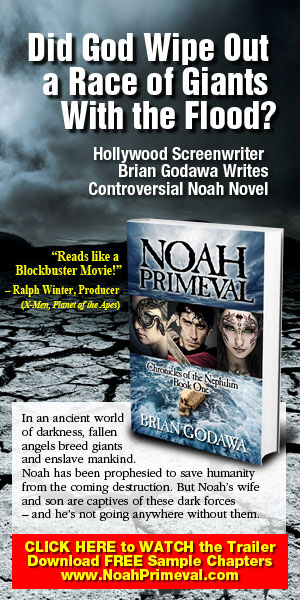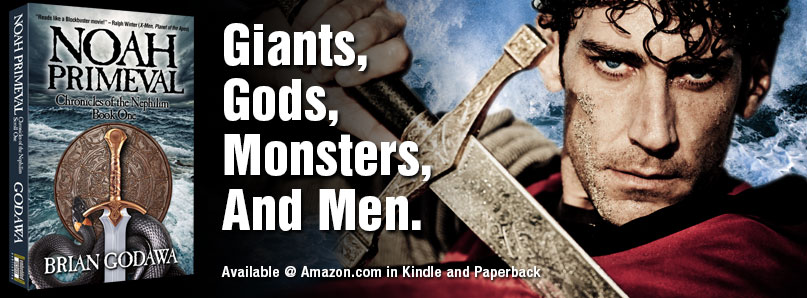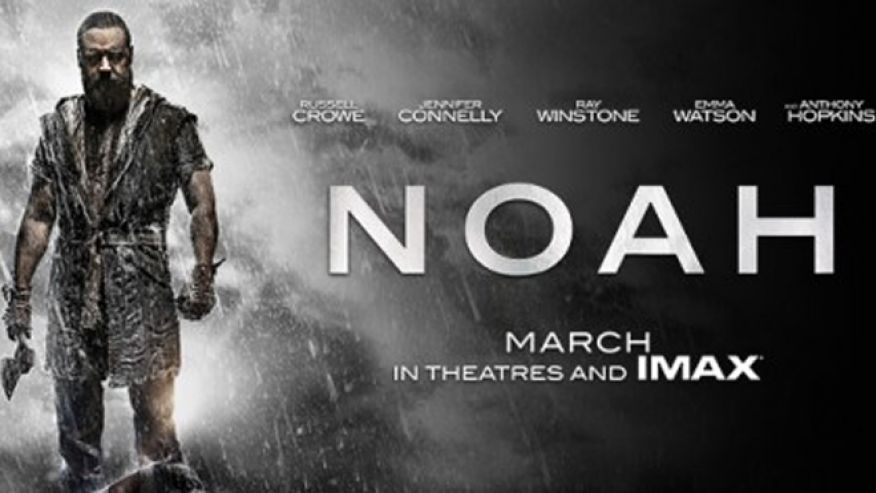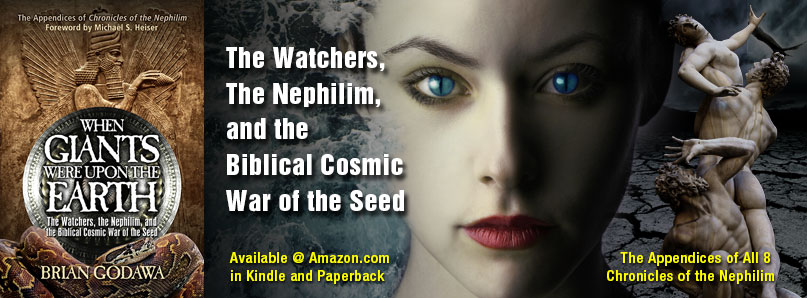Do I really need to say anything else?
Aaron Judkins Interviews Godawa on Nephilim, Noah’s Ark and the Watchers
Listen to Epic Voyages Radio Interview of Godawa here.We talk about the rise and fall of the Nephilim in the Biblical Cosmic War of the Seed. Watchers, giants, and other bizarre phenomena of the Bible as it appears in the novel series, Chronicles of the Nephilim.
The host of the show, Dr. Aaron Judkins aka “Maverick” is an author, explorer, & archaeologist from Texas. He has a passion for searching for the truth about the mysteries of the past- exposing forbidden archaeology & forbidden history. He appears in the new documentary “Finding Noah,” about the current search for Noah’s Ark.
Noah Primeval & Enoch Primordial Only 99¢
 For one week only, starting today, the first two novels in the Chronicles of the Nephilim series are on sale for only 99¢ each. Kindle Only.
For one week only, starting today, the first two novels in the Chronicles of the Nephilim series are on sale for only 99¢ each. Kindle Only.
See what all the controversy is about with these two best-sellers.
The Watchers, The Nephilim giants, and the Biblical cosmic War of the Seed.
Buy Noah here: http://amzn.to/1ChypR6
Buy Enoch here: http://amzn.to/1mJwHe4
Exodus: Gods & Kings: Thank God it Ain’t Noah. But Please DO NOT do King David.
The story of Moses retold through the eyes of secular humanists, atheists and agnostics. Okay, in some ways it wasn’t as explicitly subversive as Noah, and I liked it somewhat, but it wasn’t a great movie, it was only a good movie. Is it offensive to the Biblical worldview? Yes, though I suspect some Christians will enjoy this movie, even with its failings, than they did the horribly-done and anti-Biblical Noah movie.
But in other ways, it is more explicitly subversive of God and the Bible than Noah.
For those familiar with the Biblical story, there are some moving moments of emotion such as every scene with Ben Kingsley as Nun, a patriarch of Israel. But also Moses’ final acceptance of his people. And of course, the plagues are quite spectacular.
The story opens with Moses as an adult and a general in the Egyptian army. The Bible doesn’t say what Moses was in the service of Egypt, so this is a logical choice for an action movie, and it will come into play later as a powerful display of man’s failure to achieve through his strength what only God himself can achieve in the Exodus.
We see Moses as beloved of the Emperor over his true son Commodus — Er, wait, was this Gladiator? Oh no, I mean Moses was beloved of the Pharoah over his true son Ramses. When Moses discovers who he is, and then Ramses discovers who he is, Moses is exiled.
Oh, all the details are trivial, let’s get to the plagues!
The point is, the story is about the rivalry between two men brought up almost as brothers and how their religious identities tear them apart. Pretty cool idea, but it didn’t engage me. I didn’t believe it. Joel Edgerton is much more believable than the terribly weak cuts they used of him in the trailer. But Christian Bale seems distant, even in his romance with his wife Zipporah. He is a great actor for cold, alienating or removed characters (like American Psycho) but Moses is a man of passionate extremes. This makes it hard to care much for the human drama of the story, especially his unromantic romance with Zipporah.
Could this be because Bale was trying to play his Moses as a “schizophrenic barbarian”? The Moses in this movie does struggle with faith in God, which is Biblically fair, and he becomes more ragged and crazy looking over time, but he never crosses that border into madness that is so typical of secular interpretations of prophets. So maybe that was just Bale’s own madness in his pursuit of some kind of method acting technique. A caveat here is that it’s a great technique to make a prophet appear to be mad to the populace, when he is actually right. That kind of irony is standard storytelling technique. But it wouldn’t surprise me if Scott actually does consider Moses a crazy leader, considering his portrayal of God as well.
The problem is that Bale’s Moses never really emotionally connects with anyone, not even God. But then, God isn’t very engaging either. And maybe this is where it starts to feel off. There is a lot of intimate and engaging relationship between Moses and Yahweh in the Bible, but in this story, Moses doesn’t talk much to God and he never seems to know if he is in fact talking to God, since he alone can see him.
And God appears as a temperamental ten year old child.
A word to all you Hollywood kiss-ass Christians who want to be accepted by the “cool” secular community: It is not merely “Fundamentalist Phariseeism” to critique the God of the movie. (One could even say defending Hollywood without discernment would be like Sadducees. Pharisees aren’t too fair, you see, but Sadducees are quite sad, you see). After all is said and done, God is everything. So, yes, we care how our God is portrayed.
Now we all know that you can’t put everything in the Bible in the movie and you have to make some changes for the sake of the movie story. But the problem with this god is not merely that it does not follow the relationship as depicted in the Bible, but for mere storytelling as well, it is an alienating unfulfilling relationship. Yes, Moses had his times of arguing with Yahweh in the Scriptures, but he also communed with him. In this movie, he does not. Even apart from the Biblical text, this simply isn’t a fulfilling relationship. It is cold and distant. But then again, I would expect that atheists, agnostics and secular humanist storytellers do not understand how to portray such communing relationship because they have no experience to go by. After all, they don’t even believe it exists.
The Depiction of God’s Presence
Okay, everyone knows how difficult it is to depict God’s presence in a film, and Ridley Scott has my sympathies. We all acknowledge that the Old Hollywood way of having a disembodied voice is visually less engaging. God did appear as the “Angel of Yahweh” in many instances in the Bible, so showing him as a human figure is Biblical and works (The name of the character in the credits is “Malak” which is the Hebrew word for Angel. The Angel of Yahweh in the Bible is “Malak Yahweh” in Hebrew). Scott has said he liked the idea of a child being innocent and pure. But in contrast, the child in his movie is quite precocious and temperamental, so I think he is not being entirely forthright with us. I think he is trying to sell us.
 Again, the Bible definitely shows God getting angry, so I wouldn’t complain about that. And a child is certainly a creative choice that defies expectations, which is not inherently bad either. But watching this, you can’t help but see this impetuous child as being the incarnation of what secular humanists, agnostics and atheists like Scott and the others who wrote the movie think about the Biblical God: A tantrum throwing childish deity. This is even what many village atheists have accused the Biblical God of being in an attempt to ridicule or mock him. So I think Hollywood suck-up Christians who try to accept this incarnation as “thought-provoking,” “unique,” “conversation-starting” are just fooling themselves. The atheist and agnostic secular filmmakers are deconstructing the God of the Bible.
Again, the Bible definitely shows God getting angry, so I wouldn’t complain about that. And a child is certainly a creative choice that defies expectations, which is not inherently bad either. But watching this, you can’t help but see this impetuous child as being the incarnation of what secular humanists, agnostics and atheists like Scott and the others who wrote the movie think about the Biblical God: A tantrum throwing childish deity. This is even what many village atheists have accused the Biblical God of being in an attempt to ridicule or mock him. So I think Hollywood suck-up Christians who try to accept this incarnation as “thought-provoking,” “unique,” “conversation-starting” are just fooling themselves. The atheist and agnostic secular filmmakers are deconstructing the God of the Bible.
The Naturalism of the Story
Scott has indicated he doesn’t believe in the miracles of the Bible and wanted to depict them with some naturalistic explanations. Well, I’m going to surprise you here, but I am not entirely against depicting miracles in a way that they can be disbelieved. After all, this is exactly what happened. The Israelites would see such things and then slip right back into worshipping Ba’al or Asherah. The Egyptians and Pharaoh did not repent. The Jewish leaders concocted a theory that the disciples stole the body of the resurrected Jesus. I like the idea of showing miracles in a way that unbelievers can justify their foolishness. To be fair to Scott, during the plagues, he shows the “scientists” of Pharaoh’s court giving their pompous natural explanations for what was happening. And they clearly looked foolish, so that supported the miraculous nature of the plagues.
But here is where the story becomes confusing. Scott withdraws God so much from the story that he never communicates anything to us. The plagues just occur, one after the other without any introduction or explanation from God or Moses to anyone. To be quite frank, I would think that unless you are familiar with the story, you wouldn’t really know what was going on. And nowadays I do not think it is correct to assume that everyone knows the story. In the Bible of course, Yahweh announces through Moses each step what he is doing and why. He makes it clear. Okay, some artistic ambiguity is fine, but one can clearly see Scott’s intent is to strip God out of the picture as much as he can get away with. To make the story as human as possible. Remember, Scott does not believe Yahweh is real anyway, so he is just a metaphor for some other interpretation of human need. The more human, the less God, the better.
As a side note, the ultimate love in this story is the love that ends the picture and is a repetitive series of sayings between Moses and his wife Zipporah. “Who makes you happy? (you do). What is the most important thing in your life? (you are). When will I leave you? (never).” On a human level, these are understandable expressions of love between husband and wife. But it points out the idolatry of all humanistic stories like this. In all secular stories, the ultimate love relationship that gives meaning to life is NOT a love relationship with God, but with another human being. Again, this is understandable coming from a humanistic storyteller, that human love would become a God replacement because after all, that is the highest kind of love that they know. What secularists do not understand is that all those sayings above are what believers say of God. God is our joy, God is the most important thing in our life, and God will never leave us or forsake us. Just a little deconstruction of atheist, agnostic and secular idolatry for you.
Back to the miracles. Here is where I may surprise you. I actually liked the parting of the Red Sea as a tsunami (and the crocodile attacks turning the river to blood). It doesn’t make it less of a miracle. Kinda coincidental timing, don’t ya think? And so what if it gives unbelievers a chance to reject it. They wouldn’t believe if someone returned from the dead anyway. Now, I am not a theologian, but the term used for “dividing” the Sea in Hebrew means “to cleave, break open or break through,” (BDB lexicon), all of which can be literary or poetic expressions of what happened with that tsunami. The way the Sea was parted in the classic The Ten Commandments was just as much an interpretation and no more Biblical.
The problem with it is the same problem throughout the story. In the Bible God announces what he is going to do and challenges Moses to step out in faith and do things like pronounce the Nile will turn to blood, or in this case, hold out his staff and the waters would part. In the movie, Moses throws his sword into the water in anger that God has left them to die. Then he wakes up to see the sword sticking in the mud with the waters pulled back. So, every step is surprising to Moses. Sure, God surprises us, but I can see how Scott and his agnostic, atheist and secular storytellers want God to be unclear so that it all comes down to interpretation. In a way, it seems like making this movie for them is like the unbeliever explaining away all the miracles just like the Egyptian “scientists.”
Update: Interestingly, the most important miracle of all is the Ten Commandments written by the very “finger of God.” In the film, Moses is the one carving the tablets, not God, thus again, reducing the very foundation of morality to man’s creation, not God’s. This is far more important than you may know. What atheists, agnostics and other seculars and humanists do not realize is that without God as the foundation of morality, there is no authority above man’s arbitrary will to power. The one with the most power determines right and wrong. Period. Blather all you want about your subjective feelings, social contracts or even natural selection of morals, at the end of it all, there is no objectively real right and wrong, there is only personal feelings in conflict — the will to power.
But I deconstruct again.
The Politics of the Movie
All period pieces are stories of the past retold in light of our present situation. We tend to see through our eyes, but also seek to make lessons for the present out of the past. And movies do not exist in a vacuum. They often reflect the zeitgeist of an era. Thus the Noah movie becomes an environmentalist parable.
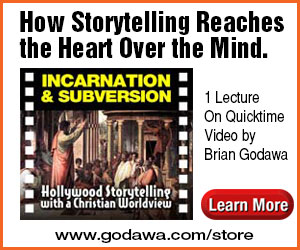 So, Exodus is infected by modern Hollywood leftist anti-Israel politics. In the Bible, Moses never uses force or violence against the Egyptians. The point is to show that Yahweh is the one who delivers, not horses and chariots or man’s strength. The movie makes a similar point, but through a different path. When the movie Moses thinks he is to deliver his people, since that annoyingly precocious and distant God doesn’t explain himself, Moses concludes that he can do the only thing you can do when you are an oppressed minority: terrorist guerilla tactics of hit and run “bombings.” And God is portrayed as accepting it, and only deciding to take over with his plagues when he concludes it will take too long for terrorist tactics to work (“Maybe a generation”). So God is a revolutionary Marxist here. Or at least an Alinskyite. Oppressed workers of the World, unite and rise up! (The conquest of Canaan is a different story with a very different justification that doesn’t apply to this story).
So, Exodus is infected by modern Hollywood leftist anti-Israel politics. In the Bible, Moses never uses force or violence against the Egyptians. The point is to show that Yahweh is the one who delivers, not horses and chariots or man’s strength. The movie makes a similar point, but through a different path. When the movie Moses thinks he is to deliver his people, since that annoyingly precocious and distant God doesn’t explain himself, Moses concludes that he can do the only thing you can do when you are an oppressed minority: terrorist guerilla tactics of hit and run “bombings.” And God is portrayed as accepting it, and only deciding to take over with his plagues when he concludes it will take too long for terrorist tactics to work (“Maybe a generation”). So God is a revolutionary Marxist here. Or at least an Alinskyite. Oppressed workers of the World, unite and rise up! (The conquest of Canaan is a different story with a very different justification that doesn’t apply to this story).
Do you see where this is leading? Ah yes, the Jews, were terrorists themselves. The connection to today is obvious. The dominant media and most of Hollywood are Israel haters who claim Israel is the oppressor today, when they are the ones who are being attacked. Some even claim Israel is doing to the Palestinians what the Nazis did to them (As some professors at Oxford have claimed in a recent debate with Dennis Prager). This of course is a monstrous lie. The Palestinians, who are actually Nazi-like in their ideology (dedicated to genocide) have been able to spin the liberal media and entertainment so that the Nazis are accusing their victims of being Nazis. Reprehensible. Insane. Evil. But fashionable in Hollywood. And truly postmodern. What next, accuse the Jews of being genocidal as Islamic regimes like Iran engage in genocide against them?
This is why I cannot help but have a little bit of schadenfreude when I see Scott having to squirm against the accusations of racism because his casting was white for all the leads. It’s nice to see that leftist political correctness come back on liberals. Liberals must eventually become victims of their own oppressive politics. Sweet. I would think this would show Scott that maybe he should not be part of that liberal insanity. Of course, Scott is actually in the right, on this one. It is the world market (and the money is based on the world) that wants those white people as leads. The world that is full of all kinds of non-white people will not pay for movies unless they have those evil white crackers in the lead. So, really, by liberal standards, if you are against casting Exodus to please a world of multicolored people, then YOU are the racist.
Bottom Line: Gimme Some Truth
One cannot help but compare it to the classic The Ten Commandments with Charlton Heston. Yes, that movie didn’t follow the Bible perfectly. Yes, it has flaws of its own, and this is a different new and modern take with a different audience with different needs and desires. But if you can just put aside all the modernist prejudice against the old classic, if you can hold off the elitist snobbery accusations of corniness, if you can suspend your modern intolerance of lesser acting and production quality of older movies, you can see something that made that old movie the massive beloved classic it is. And that something is what seems to lack in this slick special effects, cold, distant and modern version of Moses: heart and soul.
I have read liberal scholarship on King David. I know the fashionable subversion of writers like Halpern who seek to deconstruct David as a serial killer terrorist who did the opposite of everything the Bible says he did. For God’s sake, Liberal Hollywood, please DO NOT make a King David movie. Instead, I dare you to make a movie about the Islamic god, Allah, like you do about the Biblical God Yahweh. Oh no, wait, you won’t DO THAT, because THAT would get you murdered. Yahweh, Christians and Jews are safer targets for bigotry and hate speech.
One of the powerful moments of truth came from Pharaoh’s words, “Men who crave power are best fit to acquire it, and least fit to exercise it.” Maybe that’s true of Bible movies as well.
If you want an engaging and entertaining sequel to Exodus: Gods and Kings, then buy the novels, Joshua Valiant and Caleb Vigilant from the series Chronicles of the Nephilim. They will give you back that heart and soul with a love for the Biblical God so often vacant from Hollywood Biblical movies.
Noah Primeval on Sale 99 Cents!
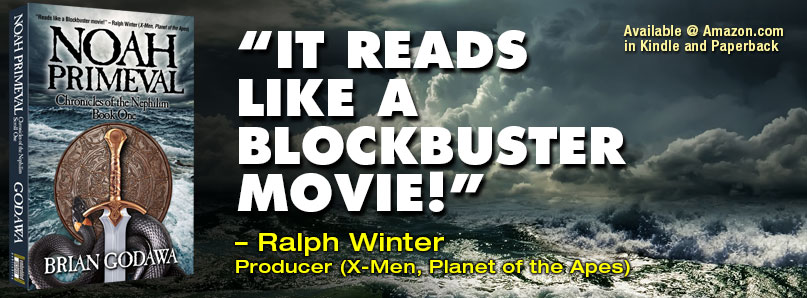
This is Not Your Sunday School Noah’s Ark.
Noah Primeval by Brian Godawa. Only 99 cents Until Friday. Biblical Fiction on Kindle. http://amzn.to/1nzi9lo
The Subversion of the Serpent in Aronofsky’s Noah
In my previous post, I explained how subversion in movies and other storytelling works. The storyteller basically retells someone else’s story, but does so within his own worldview and thereby changes the meanings of otherwise familiar memes and themes of the received cultural narrative. I then explained how Aronofsky subverted the Judeo-Christian Biblical God with his movie Noah into a humanistic metaphor of a “silent god” who has no real existential difference from a nonexistent god. I shared my conclusion that Christian defenders of the film were guilty of autobiographical projection of their own meanings onto the movie and therefore neglecting to address the director’s actual vision.
One may argue therefore that Aronofsky’s atheist subversion doesn’t work on them! Aha! Well, I wrote all about how storytelling in movies and TV works on us whether we know it or not by bypassing the intellect and connecting through emotional dramatic incarnation. That was in Hollywood Worldviews. No time to repeat all that. I’m interested in trying to exegete the director’s intent, because we owe that to the artist before we decide what we personally draw out of the movie.
But also, remember, Aronofsky is drawing from an eclectic mixture of Kabbalah, humanism, environmentalism and other sources so he is not going to have a systematic one-for-one correspondence with any one system. He carries the influence of those ideas, and about the only consistent connection between them all is their intent to subvert the Judeo-Christian sacred narrative.
“I’m Godless. And so I’ve had to make my God, and my God is narrative filmmaking, which is — ultimately what my God becomes.”
– Darren Aronofsky
Another way of saying this is that his religion is storytelling, another perspective shared by many in Hollywood who have been deeply influenced by Joseph Campbell’s mythological worldview.
Serpent Ho!
One of the things that rubs the viewer confused while watching the movie Noah is the positive image of the Serpent in the story. We see the Serpent shedding his bright green skin to come out a black snake with extra eyes (Reminding me of the mystical “third eye” crows in Game of Thrones). The Serpent’s skin then becomes the magical talisman birthright of Adam passed down to Noah. Then this Serpent skin is wrapped around the arm of the right person, it glows with presumable enlightenment and blessing. Tubal-cain, the villain, takes the skin away before Noah can receive it from his father. But it brings no glowy favor to him. Ham steals it and it disappears until the end of the movie where he gives it back to Noah. Noah then wraps the skin around his arm and it glows with favor as he touches the two little granddaughters. So the skin of the Serpent in this movie is clearly a positive image.
Defenders of the movie have lined up to try to explain away the positive image of the serpent by saying the skin represents the original goodness of the serpent’s creation before he became evil. But I think they may be projecting their own interpretation onto the imagery.
First, there is no reference at all in the Genesis text to the Serpent as being good before the Garden. It is possible, though not probable because it is deliberately not addressed in the story. It just describes him as more cunning than the other animals created (Genesis 3:1). All imagery of the Serpent throughout the Bible is always negative. Even the bronze serpent on the pole in Numbers 21 that healed the stricken was still the image of the deadly snakes hung in judgment (healing through judging the serpent). And Christ’s death on a cross likened to that serpent on a pole is also a visual metaphor for Christ taking on our sin (John 3:14) or “becoming sin for us” (2Corin. 5:21). That’s negative serpentine imagery.
[New addition in response to Peter Chattaway’s apologetic for the Serpent] Genesis 1:6 says “God created the great sea monsters.” That Hebrew word for “sea monsters” is actually tanninim, which means sea dragons. In Canaanite and other Mesopotamian creation stories, the sea dragon or sea serpent represents chaos that the chief gods overcome to create the world. So in Genesis, God is subverting that image by “defanging” the standard negative power symbol into a mere creature created by God and under his sovereignty.
In other places, this sea dragon is also called “Rahab,” but is the same sea serpent monster of chaos that the writers describe as symbolic of God’s covenantal power over the chaos (Job 9:13; 26:12; Psalm 89:10; Isaiah 30:7; 51:9)
But later, in other poetic texts, Leviathan the sea dragon takes up this personification of the serpentine negative power of chaos, only to be described as easily controlled or overpowered by Yahweh (Job 3:8; 41:1; Isaiah 27:1; Psalm 74:14; 104:26)
This negative symbolic Serpent imagery concludes in Revelation 12:9 when Leviathan is recast as the Dragon trying to kill Messiah. Here we see the description: “And the great dragon was thrown down, that ancient serpent, who is called the devil and Satan, the deceiver of the whole world…” (Revelation 12:9)
Mr. Chattaway tries to create a more diluted negativity of the Serpent in other Biblical texts but never quite does the job. Jesus telling his disciples to be shrewd as serpents, innocent as doves still reinforces the negative image of the serpent, tying it to the “cunning” we heard about in the Garden. But in ironic poetic fashion, Jesus plays an extreme counter to that image with the innocence of doves to communicate that we are not to have the evil of the serpent.
The Egyptian staffs turning into serpents is also a negative image, but Moses’ staff transformation into a snake that eats the others is simply another ironic mockery of God saying that he is sovereign over evil and can overcome it with its own negativity. Remember the sea dragon domestication? Similar thing here.
The Dan reference in Genesis 49 is a bit more interesting, but suffice it to say that the tribe of Dan resided in the area of Bashan which meant “place of the Serpent.” So the use of viper imagery there plays off that original pagan notion, but describes Dan’s fighting like a serpent biting a heel, which is another poetic play of saying Dan will be to his enemies like the evil Serpent of the Garden is to the offspring of the Woman” (Genesis 3:15).
There actually is one very powerful positive image of serpents in the Old Testament, but I’m going to make Mr. Chattaway find it for himself. And if he does, it won’t change the fact that the serpentine imagery related to the Serpent in the Garden and extended into Rahab, Leviathan and Satan is always negative. In the Bible the Satanic Serpent is never thought of in positive terms.
OMG, I almost forgot: Jesus stressed that the devil or Satan, the “serpent of old,” “was a murderer from the beginning, and does not stand in the truth, because there is no truth in him. When he lies, he speaks out of his own character, for he is a liar and the father of lies.” (John 8:44–45). There is no Biblical notion of the Serpent being good at the beginning. That is for a very theological purpose of identifying the Serpent with evil, and ultimately with the people of Canaan who would be dispossessed from the Land.
[End of new addition]
In the pagan ancient Near East of Israel’s day, however, the serpent had far more positive imagery than negative. Here are some of them as listed by scholar James Charlesworth in his book, The Good & Evil Serpent: Life, wisdom, magic, health, fertility, transcendence, creation and light, divinity, earth-lover, energy and power, immortality. (1)
Remember, Aronofsky is a self-proclaimed atheist with mystical mythical dalliances. So his spin is going to express his worldview through the narrative. And what does he do with that “Serpent of old,” that bringer of temptation to Original Sin? That Father of Lies? He inverts the Serpent from a negative image to a positive one of life, enlightenment and blessing.
This illustrates another worldview influence of cosmic humanism which has affected many in Hollywood through Joseph Campbell’s mythological mish mash and mystical monism, a kind of atheistic theology (contradictory, I know, but very relevant to Aronofsky’s view).
(Excerpt from The Power of Myth by Joseph Campbell)
MOYERS: In the Christian story the serpent is the seducer.
CAMPBELL: That amounts to a refusal to affirm life…
CAMPBELL: Why was the knowledge of good and evil forbidden to Adam and Eve? Without that knowledge, we’d all be a bunch of babies still in Eden, without any participation in life…The serpent, who dies and is resurrected, shedding its skin and renewing its life, is the lord of the central tree, where time and eternity come together. He is the primary god, actually, in the Garden of Eden. Yahweh, the one who walks there in the cool of the evening, is just a visitor. The Garden is the serpent’s place. It is an old, old story.(2)
So the Serpent was not influencing man to fall into sin, but rather opening his eyes to enlightenment and autonomy from God. You see, in this scheme, God is either a bully who wants to control man and is foiled by the wise Serpent, or is secretly desirous for man to disobey so he will learn to make his own decisions! In other words, God wants man to grab the control of defining or “knowing good and evil” for himself and not rely upon God. So in this revision, the Serpent is actually a pathway to maturity of humanity, NOT sin.
Thus, the Serpent is a positive image. And this is why at the end of the movie Noah, Illa tells Noah that God wanted Noah himself to decide if mankind was worth saving. Because it is up to man to decide good and evil and to define his fate (NOT God). Sssssound Ssssssimilar to Sssssomething?
In fact, in the beginning of the movie, when Lamech is about to give Noah the Serpent skin, he wraps it around his arm all glowy-like, and their hands are about to touch in an obvious homage to the creation image of Michelangelo’s Sistine Chapel. The creation image of God’s hand about to touch Adam to give him the breath of life. The Serpent is a “creator of life” in this story, not the bringer of death as he is in Genesis. Also, the snake skin is wrapped around the arm in the same way that modern Jews wrap phylacteries or tefillin around their arms. The symbolism of the tefillin wrapping is that they contain little boxes with Scripture in them that is meant to represent God’s Word as the binding source of everything they do (Deut. 11:18). So in the movie Noah, the life-giving Word of God is replaced with the skin of the Serpent. More creepiness.
The heart-like pulsating fruit on the Tree of the Knowledge of Good and Evil in the Noah movie most likely represents the life that Adam and Eve would receive upon eating it. Again, life instead of death.
This could also explain the odd notion that in the film the Watchers are banished by God for wanting to help mankind. That never seemed to make sense in the story. Why would God punish angels for helping mankind? Isn’t that their M.O. after all? But it does make sense if the meaning of this mythological remake is that God wants man to “do it on his own.”
Ironically, the idea that man would become mature by choosing his own destiny (against the pettiness of a jealous angry controlling God) is exactly what the Serpent suggested in the Garden to Eve: “For God knows that when you eat of it your eyes will be opened, and you will be like God, knowing good and evil” (Genesis 3:5).
This humanistic interpretation can be found in critical Biblical scholarship. Liberal scholar James Charlesworth suggests that to “characterize [God] as villain is not impossible, in view of 3:8 (the Garden is for his own enjoyment), and vs. 23 (where he feels ‘threatened’ by the man!) As villain, he is the opponent of the main program.” (3)
Charlesworth then concludes that, “The story of the serpent in our culture is a tale of how the most beautiful creature [the serpent] became seen as ugly, the admired became despised, the good was misrepresented as the bad, and a god was dethroned and recast as Satan. Why? It is perhaps because we modern humans have moved farther and farther away from nature, cutting the umbilical cord with our mother earth?” (4)
Earth worship here is linked to the Serpent as good guy. Ssssssomething Sssssounds Sssssimilar again!
Yes, I do admit that I am engaging in interpretation in this post. More than in my previous ones. And I acknowledge the possibility that I may be wrong in some ways. Is this any different than the projection I am suggesting is going on with defenders of the movie? Not quite the same thing. Because I am not importing my own Judeo-Christian interpretation upon the images of Aronofsky’s in trying to justify it. I am trying to make sense of those images with Aronofsky’s own self-proclaimed worldview.
And that is a subversive worldview indeed.
Or as Genesis would put it, “cunning.”
Buy the novel Noah Primeval, here on Amazon.com in Kindle or paperback. The website www.ChroniclesOfTheNephilim.com has tons of way cool free videos, scholarly articles about Watchers and Nephilim Giants, artwork for the series, as well as a sign-up for updates and special deals.
[UPDATE] So Mr. Chattaway has sought to debunk the critique of the positive Serpent imagery that I and others have pointed out. He goes to great length and detail in a crafty defense of the “positive Serpent” as I will call it. His beef is mostly with the “Noah is Gnostic” meme that he thinks is an unfair description of the movie, and he spends most of his energy addressing Brian Mattson’s post that first made that argument.
He then addresses this post of mine as one of the culprits of the “Noah is Gnostic” meme and says that I “referenced Mattson’s “Noah is Gnostic” theory repeatedly in a post two days ago [… and then] drops the subject in his most recent post,” — this one you are reading.
Well, not really.
Because I like Peter, I am going to give him the benefit of the doubt that he has mistakenly identified my arguments with Mattson’s and then confused my own arguments in this piece as “dropping the subject” as if I saw the weakness of it and tried to change the subject.
I never dropped the subject. I didn’t raise it to begin with. I said that Mattson made some brilliant points, but then I carefully explained my own interpretation of what was going on, which was of a different focus of concern than Mattson’s. I never argued that Noah was Gnostic. Reread my words above and in the previous post. I argued that Aronofsky is most like Joseph Campbell in his drawing from many sources including Gnostic and Kabbalah and other Rabbinic sources. I’ll say it again, for Peter and those who missed it, “Noah is not strictly gnostic or strictly humanist or strictly atheist, and obviously does in fact traffic in Judeo-Christian imagery. Indeed. Aronofsky, like most people does not liturgically follow the dogma of ancient sectarian philosophies and religion. Mattson was not suggesting that. Aronofsky does what most modern modern westerners do: He picks and chooses elements of things he likes from a variety of ultimately incongruous systems of thought.” And then, “Mattson’s claim about the influence of Gnosticism is largely right. No, Noah isn’t a dogmatic or consistent reproduction of one of the various strains of ancient Gnosticism. But in the same way the 2nd and 3rd century Gnostic Gospels subverted the Biblical Gospels by retelling the story of Jesus through a twisted unbiblical paradigm of inversion, so Noah is doing the same thing.”
Like Campbell, one of his influences, Aronofsky picks and chooses from different traditions to create a confusing mixture of ideas that nevertheless happen to have one consistent theme: The subversion of the Biblical Serpent from a negative into a positive image, along with the Serpent’s temptation that man take control of his fate and moral decisions away from a silent and harsh God. (Illa: “The choice was put into your hands because he wanted you to decide if man was worth saving.” –This is the equivalent of the Serpent’s offer of being like God in “knowing good and evil” Genesis 3:5)
Chattaway becomes confused when he relativizes and denigrates the Christian interpretation of the Serpent and then privileges Aronofsky’s Rabbinic Jewish interpretation. He says, “I think part of the problem here is that Christians have been brought up to assume that the serpent in the Garden of Eden was really Satan in disguise. The actual text of Genesis never says this — it simply says that “the serpent was more crafty than any of the wild animals the Lord God had made” — but in this, as in so many other areas, Christians read the Bible through the filter of later traditions rather than reading just what the text actually says.”
Now Chattaway is usually a rather sharp mind, but his blade gets dull here when he completely misses the inherent negativity “of what the text actually says.” The text describes the Serpent as “cunning” or “crafty,” which scholars explain is a word play in Hebrew as an opposite of Adam and Eve’s “naked” innocence. And then of course, we have his temptation and lie. Yes, he is a nasty being and that is what I was arguing. I actually didn’t argue that the Serpent was “really Satan in disguise.”
But then Chattaway dismisses the Christian interpretation as a “later interpretation” without apparent textual basis, while simultaneously avoiding the fact that Aronfsky’s Rabbinic interpretation is also a “later interpretation.” “What the text actually says” is that the Serpent was cunning and was the tempter and deceiver. It doesn’t say that he was good and became evil. THAT is the later tradition that changes the text.
The fact is that everyone is interpreting through a tradition. The question is which is the most Biblical? While Chattaway lists an impressive amount of examples from Rabbinic and other ancient Jewish extra-biblical sources to justify the “Positive Serpent” spin, he fails to address the Biblical argument itself as I have illustrated. Namely that the Serpent has an unbroken inter-Biblical “tradition” of negativity from the Serpent in the Garden to the dragon imagery throughout the Old Testament (Hebrew: tannin), to Rahab, and Leviathan the sea serpent with multiple heads (again, OT), to the seven headed dragon of Revelation. Yes, the New Testament calls the Serpent Satan, but the bigger point is that the meaning of the Serpent from Old to New Testament is as an incarnation of chaos and/or evil. (Read my paper on Leviathan here). That ain’t some “later tradition,” like the Rabbinic one he quotes.
Lest I need to remind Peter that the Christians who wrote the New Testament were in fact Jews, steeped in ancient Jewish tradition. It is a common fallacy to denigrate “Christian interpretation” as if it is something non-Jewish or “anti-Jewish” when in fact, it is the most faithful JEWISH interpretation of the Old Testament.
Bottom line: The Apostle John kicks Rabbi Eliezer’s and Pseudo-Jonathan’s butts when it comes to Old Testament hermeneutics. Canon over fodder. As I said before, Aronofsky’s Noah has surely drawn from Rabbinic and (gnostic influenced) Kabbalah sources, but my argument has been that they are antithetical to Biblical meaning.
Thus when Chattaway quotes writer Ari Handel’s statement about the shed skin of the snake being “a symbol of the Eden that we left behind. It’s a garment to clothe you spiritually,” while this certainly ties in with the sources Chattaway quoted, it doesn’t justify it as a Biblical notion but only as ancient Jewish speculation. And it doesn’t change the creepy fact that in the movie Noah, the Serpent has been transformed into a positive image through the film. Granted, it’s the skin of the Serpent. But the skin is the symbol of the Serpent. And the Serpent is the symbol of lost Eden.
Not in the Bible. The Serpent is the symbol of the enemies of God. What does God actually say of the Serpent? Not that the Serpent is a symbol of what Adam and Eve lost. But rather, “I will put enmity between you [Serpent] and the woman, and between your offspring and her offspring; he shall bruise your head, and you shall bruise his heel.” Genesis 3:15. This is a War of the Seed of the Serpent with the Seed of Eve that I am writing about in an eight volume series of novels called Chronicles of the Nephilim. (Shameless act of self-marketing. Yes, I am a capitalist. Call me Tubal-cain.)
When Chattaway defends Aronofsky’s Kabbalah and Rabbinic interpretive framework over against the Christian Jewish interpretive framework, he merely makes my argument, that the movie Noah and its God and Serpent are not Biblical.
So for a simple summary of the issues:
The Bible: Serpent bad, God good. God decides Man’s value.
Aronofsky’s Noah: Serpent good, God bad (and silent). Man decides Man’s value.
That’s subversion.
FOOTNOTES
1 James Charlesworth, The Good and Evil Serpent: How a Universal Symbol Became Christianized, New Haven: Yale University Press, p. 220.
2 Campbell, Joseph; Bill Moyers (2011-05-18). The Power of Myth (p. 54). Knopf Doubleday Publishing Group. Kindle Edition.
3 Charlesworth, The Good and Evil Serpent, p. 309.
4 Charlesworth, The Good and Evil Serpent, p. 419.
The Subversion of God in Aronofsky’s Noah
Brian Mattson’s brilliant post about the Gnosticism of the Noah movie has struck a cord of truth in a Christian world that doesn’t know why it is bothered by the film, but knows something’s rotten in Denmark. He points out from various gnostic and Jewish mystical texts the monist gnostic and Kabbalah influence on Aronofsky’s interpretation of the sacred Biblical story. Don’t worry if you can’t understand the academese gobbledygook. It will be explained below.
Peter Chattaway tries to discredit this revelation in his bulldog support of the movie, but the snake is out of the bag. The reason Noah is polarizing is because it is a subversion of the Biblical story. This is why both sides have some apparently reasonable explanations for their take. Subversion is the act of retelling a story through the prism of a different worldview or philosophy or theology or politics or take your pick. The nature of subversive storytelling is to work within the cultural memes and received narrative that people are familiar with, but to infuse that narrative with new definitions.
The movie Noah is a subversion of the Judeo-Christian story of the Biblical Noah with an atheist humanistic environmentalism accented with Kabbalah-light.
In this way, I would say that both sides are partly right. In our postmodern world that has argued the death of the author, there is a disdain for objective meaning rooted in the text or authorial intent. Therefore, we have embraced a very subjective “reader response” way of interpreting things. People tend to be more concerned about what they see or get out of a story than what the author may have intended. Thus our narcissistic culture obsessed with what we subjectively feel over what is objectively true. Traditional hermeneutics (or interpretation) seeks to understand what the intent of the author is first, and then to respond with their opinions for or against. It can recognize the subjective experience and even acknowledge that sometimes the intent of the author is not achieved. But it respects the fact that in addition to ambiguities and unintended consequences, there is real authorial meaning in the text, or in this case, story.
What I see happening is that the Christian defenders of the movie Noah tend to be importing their own Biblical interpretations onto the Aronofsky movie, justifying all the Biblical subversion and incongruities with their own ad hoc harmonizing attempts, while virtually ignoring Aronofsky’s own self-proclaimed hodge podge mixture of pagan environmentalism, humanism and atheism and a little Kabbalah mixed in for good po mo measure. In this way, Chattaway and the defenders are right that Noah is not strictly gnostic or strictly humanist or strictly atheist, and obviously does in fact traffic in Judeo-Christian imagery. Indeed. Aronofsky, like most people does not liturgically follow the dogma of ancient sectarian philosophies and religion. Mattson was not suggesting that. Aronofsky does what most modern modern westerners do: He picks and chooses elements of things he likes from a variety of ultimately incongruous systems of thought.
The problem is that dissenters against the film have been unfairly smeared as being obsessed with an unreasonable fidelity to factual Biblical details. Other than the usual few extremists, many of us do not mind that there is creative license taken. Earth to cynics: We get it. It’s okay to make changes to fit the theme of the movie or limitations of the medium. I took a lot of creative license with my own novel, Noah Primeval, and Christians have not attacked me (except for those handful of extremist fundamentalists). What we are concerned about is what the changes add up to mean. What is the storyteller making the story to mean? In this way, dissenters are respecting the director more than the defenders. And since the “auteur” himself has expressed certain aspects of his worldview, such as being an atheist, and humanist with a touch of Kabbalah fancy, we would do well to consider that in our understanding of his movie.
And yes, just because the filmmaker is an atheist doesn’t mean he can’t retell a sacred story, or even do it better than some Christians could. But in many cases that atheism or humanism can actually “repurpose” the story to another view — and it often does. And that is what has happened. The sacred story of Noah has been subverted into a humanistic but ultimately pagan narrative.
If someone made a movie about Martin Luther King Jr. and portrayed him as a religious nut who had hallucinogenic delusions thinking they were from God, and almost murdered white people before turning pacifist, the African American community would rightly be adamantly opposed to such a story (And Hollywood would never do that, would they?). It wouldn’t matter if the filmmakers said, “Hey, lay off, we showed that in the end he brought about real change for civil rights didn’t we?” It matters how you get there.
Mattson’s claim about the influence of Gnosticism is largely right. No, Noah isn’t a dogmatic or consistent reproduction of one of the various strains of ancient Gnosticism. But in the same way the 2nd and 3rd century Gnostic Gospels subverted the Biblical Gospels by retelling the story of Jesus through a twisted unbiblical paradigm of inversion, so Noah is doing the same thing.
I don’t know how much clearer it can be. Aronofsky is an atheist. He does not believe in the God of the Bible. If you doubt this, ask him yourself, “Do you believe that the Biblical Yahweh really exists and is the one true God?” He has said that he believes the Noah story is merely a myth that is not “owned” by the Judeo-Christian worldview. So, Christians and Jews, when he is retelling your sacred narrative about Noah, God is merely a metaphor to him for something else much more important to him. For a different god. It has to be, by his own self-definition.
So what is that god? That is what dissenters are getting at. Appreciate all the similarities with the Bible you want, but you simply cannot argue successfully that Aronofsky is presenting the Biblical God Yahweh. He doesn’t believe in that God.
Case in point: God in the movie Noah. God is “believed” in, but he never speaks. He is silent. Noah has dreams of a Flood and he interprets it as judgment from “the Creator.” Later, Noah believes God wants him to end the human race by murdering his granddaughters. In the end he can’t do it, and we hear from the sage words of Illa that God wanted Noah to decide if humanity was worth saving. But God never speaks up to let us know what he really thinks.
Defenders will say that God was silent because he was withdrawing from the evil (meat-eating) mankind. And since the Flood really happened, well, isn’t that proof that the visions were from God after all? So isn’t that Biblical in result?
Not if you take Aronofsky’s own views seriously. As an atheist, he doesn’t believe in the Biblical God, so if he is retelling a Biblical narrative, the best way to deconstruct God, or to make him in the story as if he wasn’t really there at all would be to claim that he is silent. This is brilliant subversion. Think about it, folks, God NEVER speaks in the entire movie. Not even to tell Noah that he was wrong to almost kill the girls. Even when righteousness is finally achieved in Noah’s “redemption,” God still does not speak. He never speaks. That is not happenstance. There is a reason for that. A Non-speaking God is virtually the same practical thing as a non-existant God. And it is explained when Illa tells Noah that “God wanted you to decide if man was worth saving.”
MESSAGE: It’s all up to us humans, not a god.
Of course, the original sacred narrative requires a “god” in the story, but an atheist director wants to deconstruct that god into a being who is merely believed in, but ultimately is no different than humans making our own meaning. Effectively there is no difference between this “god” and no god at all. This is a common belief of humanism that even if there was a God, he wants us to decide for ourselves. To give us all those nasty commandments is just a jealous judgmental deity who doesn’t want us to grow up and be mature and decide for ourselves what is right and wrong.
Sound familiar, all you Bible scholars? Call it the influence of gnosticism, call it humanism, call it atheism, or not. Just throw out all the “isms” if it’s all too much academic-speak. The point is that all these trajectories have the same origin point: The lie of the Serpent. They all try to circumvent God by positing that man can “know good and evil” for himself. Man is to decide his fate and destiny, NOT God.
Take away God’s propositional personhood and you’ve already reduced him to the functional equivalent of mere subjective belief, which is no different than delusion. This is using a story about God to subvert that God. Remember, Aronofsky is an atheist who believes that man was NOT made in God’s image, but God was made in man’s image. So no matter what interpretation Jews and Christians may bring to the movie, Aronofsky is not affirming the Biblical God. This is not a conspiracy theory, folks. Aronofsky is the one who admitted that he does not believe the God of the Bible. It’s simply how a good atheist uses a sacred narrative to spin his own view against the text.
Now, in the Biblical Noah story, it is very important that God does in fact still talk to the righteous Noah. This is not a silly little unimportant detail that neurotic Christians are needlessly obsessed over. This is everything. God is there and he is not silent. And he is the one who decides what is right and what is wrong, and if mankind is worth saving. We are not the captains of our destiny and the masters of our fate. For that is what the Serpent was saying in the Garden: “For God knows that when you eat of it your eyes will be opened, and you will be like God, knowing good and evil” (Genesis 3:5).
But didn’t the Watchers come from heaven, and didn’t the Flood actually happen just as the dreams predicted? Doesn’t that show that God was real in the story? Well, one of the dreams was drug induced by Methuselah, which places it squarely in the broad mystical tradition that does not require a god for such things. So visions are the religious experiences of mystics or sensitives, but without a God speaking propositionally, they really do not require a god at all. There is a reason why an atheist director never has a God who speaks, because a God who speaks would be a truly existent being.
As for the Watchers, this is where more subversion comes in. Of course there will be some elements that may point to spiritual reality, but the real purpose is to dethrone the living God, so allow the lesser spiritual stuff which satisfies that “myth loving fantasy side” of us, and focus on redefining God and his relationship with man. That is how subversion works. Use the cultural memes and narratives but invest them with new meaning. So including other spiritual realities like angels does not discount the deconstruction of God going on in the story. You can have your angels, but not your Biblical God.
But even with the Watchers, there is a complete inversion going on there as well. In the Biblical Enochian tradition, the Watchers who came to earth were fallen and delivered evil occultic secrets to mankind. So there is a mutual culpability of angelic and human sin that brings on the Flood. And the fallen Watchers were then imprisoned in Sheol for their disobedience. But in the movie, The Watchers gave wisdom to man that was abused. So again, that which is considered negative deception in the Biblical tradition is considered positive wisdom in the movie.
And that brings us to the Serpent. In my next post, I will explain how the Serpent and the Garden of Eden is subverted in Noah.
P.S. When The Matrix came out, I am the first to say that while I had some profound connections to certain visual elements in the film, such as the “born again” scene when Neo wakes up in the pod, or other “Christ imagery,” I nevertheless had to face the fact that it was NOT a Christian themed movie. No matter how much I personally experienced it. Now, we are all free to ignore what the author says and simply interpret the story through our own subjective viewpoint, but that is disrespect toward the authors that we would not want for ourselves and it illustrates our narcissistic culture. The Wachowski brothers, who are avowed Nietzschean atheists were using Christian memes and blending them with other religious elements to subvert them with their “army of metaphors” as a story that ultimately deified man as saving himself. They were subverting the well known Judeo-Christian worldview and I wrote about it here.
Deconstructing Noah’s Arc: Godawful Storytelling
I’m the “little guy” who wrote a blog post critiquing an early draft of the Noah script because of my own research into the subject matter. Well, when things went south in the studio screenings of the movie with religious audiences, the blood hound media scoured the internet for negative quotes, found my post, and it went viral.
I thus became Satan for Paramount and its elitist director of dark unsympathetic sick and twisted heroes, Darren Aronofsky.
I finally saw the movie. And now I know why Paramount and its hired Christian marketers would not let me into an early screening to correct my analysis of the early script of Noah.
Because I was right.
Not only that, but the differences between the script and the final movie are so negligible that I won’t have to change a single word of my critique. Just go back and read that and you’ll get the sick twisted agenda that seeps through every frame of this movie.
Wait. I take it back. It’s actually worse than the script.
But right up front, I apologize for giving so much time and attention to preparing people to watch the movie with a thoughtful eye to see what is good first and then describe the bad. Sometimes movies are so bad that what little good in them is so overwhelmed it’s like – well, like being drowned. My problem was I took it too seriously.
The Noah movie is ugly. It’s anti-human exceptionalism. It’s enviro-agitprop. And it’s poorly done. I can’t recommend this movie, not just because of it’s godawful theology (or should I say “earthology”), but because it’s godawful filmmaking. Like The Last Temptation of Christ. All the controversy overshadowed the fact that it was just plain terrible storytelling. Same here.
And people complain about Christian movies being so bad because they are agenda driven while suffering from poor storytelling and preachiness. Well, how about a new term: “Bad atheist movies” that suffer from poor storytelling and preachiness.
I have to say something to all those Christian leaders and film critics who saw the early screenings and kept defending the movie, saying in reference to my viral blog post, “The movie is different, the movie is different. You can’t talk about the movie cause you haven’t seen it.”
Shame on you. Shame on you because you knew when you were saying it, that it wasn’t true and I was right. You were tools. And Aronofsky is laughing at you behind your backs. He’s subverting your sacred story and he’s not even doing it well, but you’re still supporting it. I spoke up for the truth, but you wouldn’t, and you led me like a sheep to the… Okay, maybe I’m not that righteous. I’ve lied before too. As the movie Noah would say, “meat-eating is in all of us” or something like that.
Was Anything in it Good?
Well, uh… the movie captures a visual picture of the Flood that has never before been captured. That’s cool. Bursting waters, a Doré homage of people on a mountaintop being pulled into the rising waters. Okay, Flannel graph successfully overthrown. I liked that.
Oh, and uh people are shown as really evil so they deserved to die. That’s true. (Even though the evil is really more about meat-eating than anything else.)
Ummm.
Okay, now I want to talk about what I didn’t like about it.
“On the nose” dialogue. Flat characters that you just don’t care about. A sick twisted hero that you just don’t care about. Look, I know your hero has to have a character flaw, but this is so extreme that you can’t stand Noah, and you just want to leave the theater.
Noah becomes so convinced that the wickedness of man is in everyone (that is the original sin of being bad to animals and the earth – and did I say meat-eating, you carnivores?) that they all deserve to die, including his family — and then Noah becomes obsessed with killing his newborn granddaughters on the ark. Of course he doesn’t. That’s good. Whew. Not. Good. Enough.
Aronofsky gave us his “brilliant” portrayals of sick twisted drug addicts, sick twisted wrestlers, and sick twisted ballerinas. And now, in a fit of creative originality, a sick twisted Noah! Do you think maybe there’s a pattern here that might say something more about Aronofsky than anything else?
The fact that Noah wrestles with justice and mercy through the story is a good thematic idea. Justice without mercy is cruelty, but mercy without justice is also cruelty. But as Aronofsky said in an interview Noah’s journey is God’s journey of being so judgmental that he has to learn mercy. Because you see, Aronofsky has said he is a humanist. Humanists believe man is the measure of all things and man is not created in God’s image, God is created in man’s image. So it makes sense within his atheism to portray God as learning to be more merciful since God is merely an extension of man’s own imagination.
Remember when I said the script has Noah as a humanist who is more compassionate than God because he just can’t bring himself to kill his family like God wanted him to? Still in there. Yep.
Cliché stereotypical bad guy. Now whenever you want to know who a storyteller hates, look at his bad guy’s belief system and rationale and you’ll find a comparison to a modern day counterpart. Okay, so Tubal-cain is the bad guy. He is an urban “industrialist” (the movie calls the cities, “industrial”) who mines the earth for resources, claims property rights to owning land, hunts animals, eats meat, uses a primitive gun (I’m not kidding you, he probably got it from ancient aliens), he keeps emphasizing that man is created in the image of God and superior to the animals, and that we are supposed to subdue them and have dominion over them. All this while he rapes, murders, pillages and eats meat. So that kind of thinking is supposed to lead to that kind of evil behavior, got it? Sooooo, let’s see, who are those in todays’ world that believe in industry, mining for energy, private property rights, in hunting, guns, and say that God created man in his image to have dominion. Tubal–cain is basically an evil caricature of Judeo-Christian Western civilization. Seeing behind the shallow stereotype of evil reveals as much about the storyteller’s perception of what worldview he considers leads to such evil.
Christians, you are tools being played if you think that this movie is anything BUT a subversion of the Biblical God and an exaltation of environmentalism and animal rights against humans. Those who say that hurting the earth is just part of the sins of mankind in the story are missing the deeper point. No matter what “sins” of man that are portrayed in this story, they are only expressions of the ultimate sin, which is to sin against the earth. Every time it talks about man’s sin and God’s intent, the context is always “creation” not God, and not man as God’s image. The guy who preaches “man as God’s image” is the villain. “Creation” as in “Nature” is the metanarrative here, NOT God.
For those of you Christians who are fooling yourselves, just ask yourself this: Does Aronofsky believe in the God of the Bible as holy or in the earth as holy? I think you know the answer. And it ain’t both.
The very first thing said and repeated later is “In the beginning, there was nothing.” Now folks, Aronofsky is an atheist. He is subverting your Creation narrative that says “In the Beginning God…” not “Nothing.” Atheism believes that everything came out of nothing. And they say Creationists believe in irrational anti-science fairy tales!
Even in the end, Aronofsky’s humanism subverts God when Noah has his revelation about God’s purpose. Why didn’t God tell him whether or not to kill those little granddaughters so that the human race would never again corrupt Mother Earth? He kept asking, but God was silent. His daughter-in-law tells him “because he wanted you to decide if man was worth saving.” You see, it’s all up to man. God is not the one to decide if man is worth saving, MAN is. Because of course, in Aronofsky’s humanistic atheistic universe, God is only a belief, not a real being, and man must make the ultimate decisions of value and dignity.
Well, I say no thank you Mr. Atheist. That leads to guillotines, gulags, and gas chambers – which were all spearheaded by ATHEISTS.
Aronofsky has hijacked the Biblical narrative and subverted it to preach his secular humanistic atheist enviro-worship. He said himself that the story is just a myth that he turned into a prop for environmentalism. But its not even good preaching. It’s cheesy atheist preaching.
I found it telling that the movie that stresses so much about how bad meat-eating is, would fail to include the fact that God himself killed animals to clothe Adam and Eve, and that righteous Abel sacrificed animals as worship to God. He was after all, a shepherd of herds. And lastly that regardless of any alleged vegetarianism before the Flood, God decreed after the Flood that all living things were good for man – to – EAT! In the Bible, Noah was a member of PETA all right: People Eating Tasty Animals. But of course, that doesn’t fit the environmentalist/animal rights agenda. THAT God is evil to them. But you can see where all the attacks against Christians for nitpicking “unbiblical details” is not an entirely fair accusation. Because sometimes, those details are changed because the director is subverting the story to spin it to his ideological agenda against the text.
I heard Mr. Aronofsky is a vegan. He better be, after watching the hate fest against meat-eating in this movie. I’d like to invite him over to an animal rights barbecue to discuss the moral and intellectual impoverishment of atheistic humanism. And I would love to learn how he powered that movie set and production with solar and wind power. Must have been a real miracle. Oh, you mean he burned fossil fuels to make the movie, just like Tubal-cain? Oh, that’s right; Celebrities get a Green pass for their conspicuously Nephilim-sized carbon footprints.
But the topper has got to be the Rock People. They are supposed to be the Watchers that fell from heaven and took on cooled magma as their bodies, and now they are helping Noah. But they look like goofy ancient Transformers who, instead of transforming into cool cars and trucks, just transform into – well, rocks. They completely make you suspend your suspension of disbelief because they are so goofy. Remember Jar Jar Binks? Yep, that bad. I won’t even go into how wrong Aronofsky got the Watchers, which were bad guys in the Biblical and Jewish legends, but he makes them good guys! But that’s in my earlier critique.
The special effects, from the weak opening graphics to the alien-like luminescent bodies of Adam and Eve, to the most unscary serpent I have ever seen in a movie, to the silly looking large Rock People, the visual imagery is that of a B-grade movie. Where did that $130 million go? To Solyndra and Al Gore? You watch the movie asking yourself, is the director trying to make some kind of “artistic statement” by using cheap looking special effects? Or is he just so used to making low budget movies that he doesn’t know how to do it any better?
But in the end, Noah does realize his extremism was all wrong and that he should “be fruitful and multiply and replenish the earth.” So maybe I’ve got it all wrong. Maybe Aronofsky is a crypto-Christian who is secretly trying to show that atheist environmentalism is obviously insane and immoral and leads to murdering humans in the name of compassion to animals and the earth.
Or maybe, like today’s environmentalist anti-human exceptionalism, he cannot see the irrational contradictions of his own beliefs that deconstruct.
At least Avatar, with its naked pagan earth worship, has a ring of more authenticity than trying to subvert someone else’s sacred narrative with silly rock people and bad guys who cling to their guns and eat meat. But also because Avatar is just a well made pagan movie.
Noah is a poorly made atheist movie. Noah tanks.
P.S. I am not now, nor have I ever been a card carrying member of the oil company cartel.
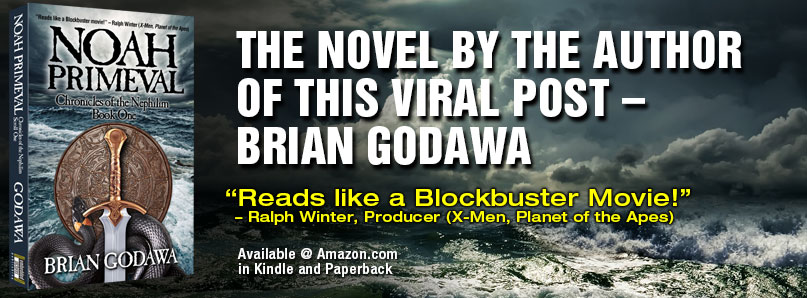
The Noah Movie: How To Watch It with Wisdom and Discernment

In my last post, I addressed the issue of concern that some religious believers have about whether or not to see the new movie Noah by atheist director Darren Aronofsky. I explained that there was merit in both arguments to see or not to see the movie. I concluded that if you were not sure whether you wanted to see it or not, I will be blogging my own analysis of the movie after it opens on March 28. Or you can read other reviewers you respect before you make your decision.
I’m the Hollywood screenwriter and novelist who wrote the blog analyzing an early script of Noah that went viral. It was quoted by all the news outlets, mostly for its negative comments while ignoring the positive ones.
Why did I do it? Because I LOVE movies, and I see their potential for both good and bad influence on our cultural values. That’s why I wrote Hollywood Worldviews: Watching Films With Wisdom and Discernment. To help people decide for themselves what values and meanings they are ingesting in their media consumption.
But I’ve also studied the story of Noah for many years, wrote an Amazon category bestselling novel called Noah Primeval, and set up a website, www.noahprimeval.com for all things Noah. My fans want to know about these things, and so do I.
Things To Look For
Most movies are a mixture of good and bad. But discerning that difference can be difficult without a more informed approach to understanding how storytelling and film embodies worldviews and meaning. So, if you’ve decided to watch the movie, I wanted to offer up some ideas to keep in the forefront of your mind as you watch. These will help you understand and appreciate what you like about the movie and be able to discern what you may not like about it for your discussion with others.
Have Some Tolerance For Creative License And Fantasy In The Story
Some hyper-literalists are already complaining that the movie doesn’t follow the details of the Bible. But some of those details are either not relevant or subject to differing interpretation. So chill out.
Take for instance, one example some have talked about. The Bible says that “eight persons were brought safely through water” (1 Peter 3:20). That is, Noah, his wife and three sons, and their three wives. But some hyper-literalists have yelped that in the movie, only six people are in Noah’s family on the ark. Two wives are missing.
The problem with this criticism is its lack of imagination. We find out that one of the daughters is pregnant with twins, which will be the two wives of the other two sons. So, if you are a Pro-Life Christian, then you have to acknowledge that that is technically the eight persons on board, including the four wives. Unless you want to deny the humanity and personhood of the unborn.
Watch The Hero’s Character Arc (not Ark)
The details that really do matter are the ones that reflect the meaning or worldview of the story. And those can be found in paying close attention to the hero’s journey. In storytelling, the hero’s journey is the incarnation of the meaning of the story.
The hero starts out as someone we root for and so we learn to see the world through his eyes by our identifying in sympathy with him. But the hero has an inner flaw, something wrong about the way he sees the world. This flaw results in him making some bad choices. So even though he is sympathetic, we still see he has a goal that he pursues for flawed reasons. As he pursues that goal, he is blocked by obstacle after obstacle, including the villain, that thwarts him at every turn.
The story builds until the point where the hero appears that he will never achieve his goal. When all hope is lost, he faces the truth about himself and gains the inner understanding of his flaw that allows him to achieve what he really needs instead of what he wants. He then embraces this truth, changes and finds the strength to do the right thing at the end. This is the redemption of the hero.
What Is The Hero’s Character Arc In Noah?
Noah was a righteous man of faith. But he was not sinless like Jesus Christ. Noah was a sinner, and therefore had character flaws. The Bible reveals Noah’s drunkenness after the Flood for instance (Genesis 9:21).
So look for Noah’s character flaw in the story and you will understand the meaning that the storyteller is conveying through the hero’s discovery of that flaw. What Noah learns by the end of the film is the moral premise of the story.
How does Noah see the world in the beginning of the story?
As the story moves, what is apparently wrong about the way that Noah sees the world?
What is the villain’s motivation for fighting Noah? This will be the worldview that the storyteller is trying to criticize as wrong or evil.
What is the catalyst that helps Noah to see he is wrong near the end of the story?
How does he change his view about the world or himself and why?
What does he do differently at the end to show a changed life?
The problem with some movies is how dark and unsympathetic the heroes can be. Ask yourself is Noah’s flaw too extreme? Does it make him unsympathetic to you? Why or why not?
That is how the storyteller influences us to see the world through the eyes of the hero with whom we sympathize or identify with.
Bonus Questions About God
God is a tough character to depict in film. Too direct and it seems cheesy, too indirect and it seems like God could be the delusions or dreams of a religious nut.
How is God depicted in the movie?
Does he have a real presence or is he depicted more as a belief that could be explained as self-made dreams or delusions?
Why is God ultimately judging the world? Many sins will surely be depicted, but is man’s sin against God the primary reason or is it man’s “misuse” of the environment?
Since Aronofsky is an atheist and does not believe man is created in God’s image, but rather that God is created in man’s image, how do you think that worldview informs his take on the sacred story of Noah?
Brian Godawa. Hollywood screenwriter and author of the Amazon bestselling novel, Noah Primeval, a Biblical fantasy with creative license that retells the Noah story without a modern secular or environmentalist agenda.
The Noah Movie: To See or Not To See?
With all the controversy surrounding the new Noah movie, many Christians, Jews, and Muslims are wondering whether they should go see the movie that was directed by atheist Darren Aronofsky and stars Russell Crowe in the lead role as the sacred mariner.
On the one side are the cultural anorexics who demand that a movie about the Bible should follow every jot and tittle detail from the Bible as they interpret it, without any creative license. They tend to yell “boycott!” and seem so hyper-literal in their views that they often miss the deeper poetic meaning of much figurative language in Scripture.
On the other side are the cultural gluttons who tell religious believers to shut up and go see the movie, and be happy with what Hollywood gives us instead of complaining. They tend to lump all criticism into the “angry reactionary Christian” stereotype and seem to be more against their own spiritual family members than the world that rejects their Savior.
I feel like I’m in between those two extremes. I’m the Hollywood screenwriter and novelist who wrote the blog analyzing an early script of Noah that went viral. It was quoted by all the news outlets, mostly for its negative comments while ignoring the positive ones.
Why did I do it? Because I LOVE movies, and I see their potential for both good and bad influence on our cultural values. That’s why I wrote Hollywood Worldviews: Watching Films With Wisdom and Discernment. To help people decide for themselves what values and meanings they are ingesting in their media consumption.
But I’ve also studied the story of Noah for many years, wrote an Amazon category bestselling novel called Noah Primeval, and set up a website, www.noahprimeval.com for all things Noah. My fans want to know about these things, and so do I.
To See or Not To See?
On the one hand, there is the argument that we should not give our money to Hollywood studios who will only be encouraged to make more movies that twist our sacred stories unless they listen more carefully to their audiences. It seems Christians are the only politically correct victims that are still acceptable to villainize in the media. These Christians supported The Passion of the Christ and Son of God, but they question Noah and the upcoming Exodus movie by atheist director Ridley Scott. They are not the intolerant bigots that some want to make them out to be. They care about their sacred story being subverted into a secular worldview. That is a legitimate concern.
But on the other hand, I also understand the argument that this movie is an opportunity to engage with the culture. Good or bad movie that it will be, Noah is opening the discussion about a topic that is normally ignored or scoffed at in our culture. This is a Gospel opportunity like never before. Christians can and should seize the moment to talk about the God of Noah who rescues us through the ark of Jesus Christ from our sins.
Now, you can’t very well talk intelligently about a movie you haven’t seen. People won’t respect your view if you haven’t. But if you have seen it, then you can show people how actually open-minded Christians are by saying what you liked and did not like about the movie. After all, no movie is all bad or all good. Most are mixed bags of good and bad. You can explain where you think the movie diverts from the Bible. You can encourage them to read the original story, since everyone knows the book is usually better than the movie (Except for Forrest Gump and the Godfather). And you can do so respectfully and with a winsome attitude of tolerance that atheists usually do not have for you.
I will be seeing it because I am a screenwriter and blogger about movies to help forward the conversation about the worldviews and meanings of movies. And of course, I have my own Noah Primeval novel and website, so my fans want to know. Plus, I don’t have to agree with everything in a movie to appreciate what is good in it.
So my advice is that if you really don’t trust Hollywood or are not sure you do in this particular case, then keep an eye on my Movieblog, because I will be writing a review on the opening release date of the movie with my analysis. Until then, I can’t recommend or not recommend a movie because I haven’t seen it.
If you do want to see the movie, then on the next post, I will give advice on the kind of things to look for when watching a movie to determine the worldview and values it is espousing through the art of storytelling. It’s not always obvious, but it is always there.
Brian Godawa. Hollywood screenwriter and author of the Amazon bestselling novel, Noah Primeval.

